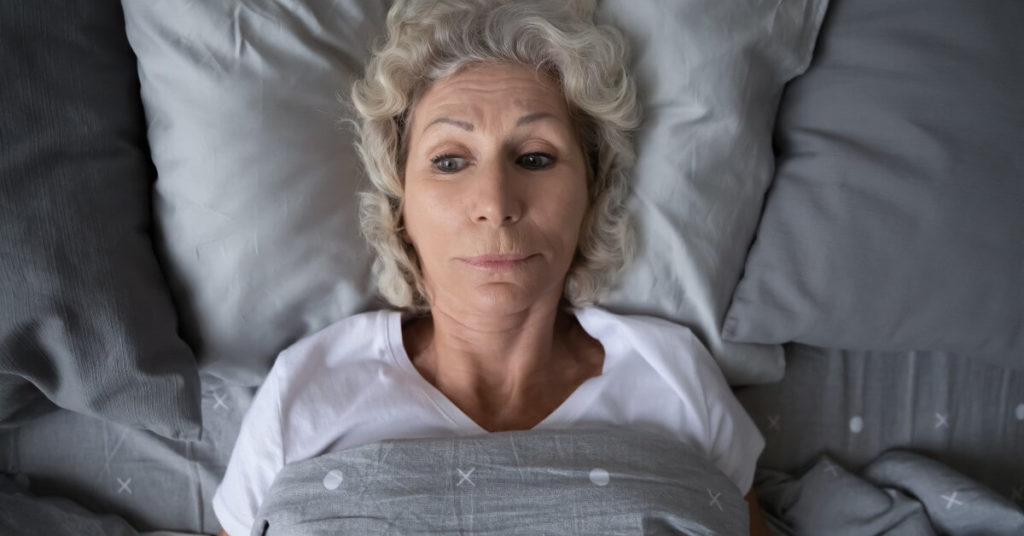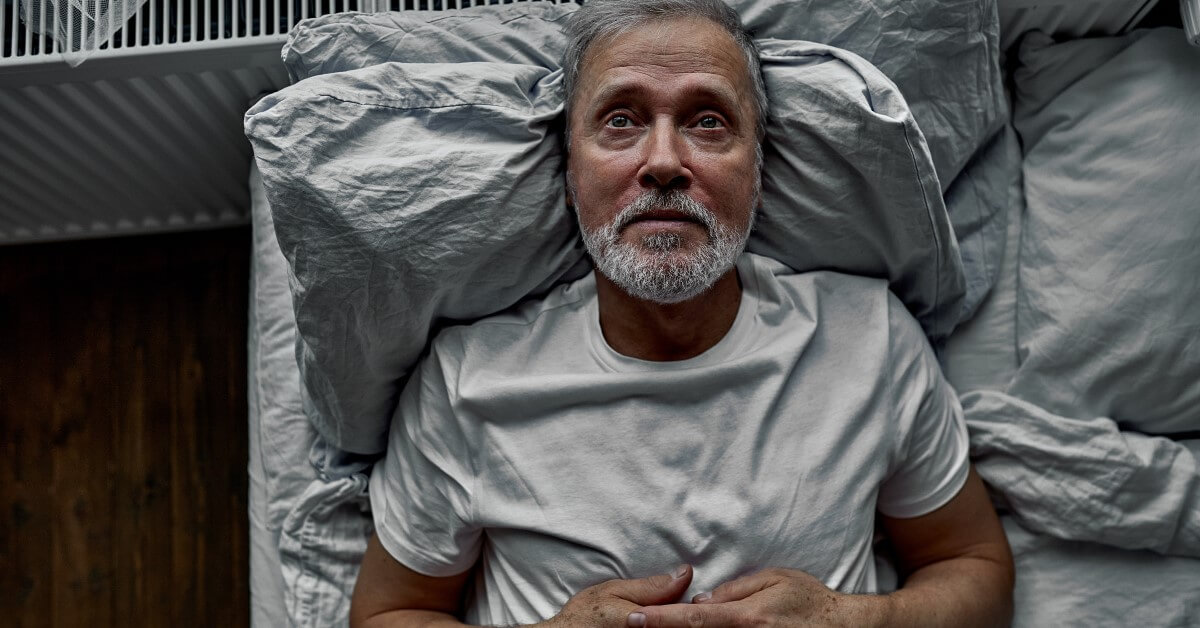
Medically reviewed by
Dacelin St Martin, MD
Triple board-certified in Sleep Medicine,
Internal Medicine, and Pediatrics.
Reasons Aging Impacts A Person’s Sleep | Sleep Tips For Elderly Persons
Overview
It’s common knowledge that we sleep fewer hours every night as we age. Studies reveal that over 50 percent of seniors experience difficulty falling or staying asleep.[1]
Although the reason for this occurrence is not fully understood, experts have proposed several explanations for this seemingly inevitable phenomenon.
This article will elaborate on why getting quality sleep becomes increasingly difficult as we age and highlight tips to improve and maintain healthy sleep.
Reasons Aging Impacts A Person’s Sleep
Sleep experts have identified some reasons one may experience sleep troubles as one age. Let us take a look at them.
1) Internal Clock Changes
A cardinal reason the elderly find it hard to sleep relates to age-related internal clock changes. The internal clock is a biological mechanism in the brain specifically, in the suprachiasmatic nucleus (SCN).[2]
The internal clock controls all circadian rhythms. These circadian rhythms influence our daily activities and bodily functions, including sleep and wake, hunger and satiety, sexual drive, and when the body releases specific hormones.[2]
Scientists have indicated that aging causes a decline in the function of one’s suprachiasmatic nucleus, disrupting circadian rhythms and consequently impacting one’s sleep and wake time.[3]
Additionally, studies show seniors get fewer external cues than necessary to stabilize their circadian rhythm.[4] For instance, light is one of the most influential cues for stabilizing circadian rhythms. Unfortunately, research has shown that many elderly persons receive inadequate exposure to daylight, with an average of approximately one hour each day.[4]
People with Alzheimer’s disease and those who reside in nursing homes may have even less opportunity to spend time outdoors and be exposed to natural light.
2) Decreased Blood Level of Sleep-Promoting Hormones
Another critical factor is a decrease in the production of melatonin and cortisol. These hormones help regulate the body’s sleep-wake cycle.
Experts have suggested that a reduction in the body’s ability to produce these sleep-promoting hormones may also contribute to the difficulty sleeping experienced by elderly persons.[5]
3) Health Troubles
Typically, older adults are more likely to experience health troubles like heart disease, diabetes, Alzheimer’s, incontinence, and arthritis. These physical and mental illnesses disrupt sleep.
A survey of a thousand American elderly men and women aged 55-84 showed that 83 percent of those who participated in the study had at least one of eleven medical disorders.[6] Also, nearly one-quarter of the older people had four or more health conditions.[6] Furthermore, seniors are likely to have two or more of these illnesses, severely affecting their sleep duration and quality.
Additionally, treatment for medical conditions can contribute to sleep troubles among seniors. It’s estimated that about 40 percent of older adults (65 years or older) in any population take five or more medications daily.[7]
Several of these drugs are known to impair sleep. Some drugs, such as antidepressants and corticosteroids, can keep the elderly awake and exacerbate insomnia symptoms. Also, other medications, like antihistamines and opiates, can cause daytime sleepiness.
4) Lifestyle Changes
The lifestyle changes that commonly accompany aging may contribute to the poor sleep quality of seniors. For instance, retirement results in less time spent working outside the home, potentially more napping, and a less organized sleep routine.
An American Study indicates that approximately a quarter of people aged 65 and up are estimated to nap daily. In contrast, only about 8 percent of younger adults do so.[8]
Sleep experts believe that napping, especially later in the day or for more extended periods, might make it more difficult to initiate sleep at bedtime and cause overnight sleep disruptions, even if some have suggested that brief naps during the day are beneficial.
Sleep Tips For Elderly Persons
Do you have a hard time getting a good shut-eye at night? Here are some sleep tips that can improve your sleep significantly:
1. Stick to a Routine: You should maintain a regular sleep-wake schedule, even on the weekends. Creating a consistent sleep schedule and sticking to it can help regulate the body’s natural sleep-wake cycle.
2. Create a Sleep-Conducive Environment: Keep your bedroom at a comfortable temperature, dimly lit, and quiet. Also, using a high-quality mattress and pillows can improve your sleep significantly.
3. Avoid Caffeine, Nicotine, and Alcohol: Drinking alcohol, smoking cigarettes, using caffeine, or simply eating a heavy meal late in the day can make it more difficult to initiate sleep or stay asleep. Try cutting down on the amount of caffeine you drink, giving up smoking, and eating late dinner.
4. Exercise Regularly: Physical activity can help improve sleep quality and reduce insomnia symptoms.
5. Limit Screen Time: The blue light emitted by electronic gadgets might inhibit melatonin synthesis and make it harder to sleep. Make it a goal to stay away from tv screens for at least one hour before bed.
6. Avoid Daytime Naps: Afternoon naps can interfere with your nighttime sleep. If you need a shut-eye during the day, keep it short. You shouldn’t take any naps after 3 pm.
7. Relax Before Bed: Before going to bed, take some time to relax by engaging in activities that you find calming, such as reading a book, taking a warm bath, meditating, or doing deep breathing exercises.
8. Consider Cognitive Behavioral Therapy for Insomnia: Cognitive behavioral therapy for insomnia (CBT-I) may be an effective treatment option for seniors with chronic sleep difficulties.
9. Consult with a Doctor: If sleep difficulties persist, it is essential to consult your doctor to rule out any underlying medical conditions.
References:
- Neikrug, A. B., & Ancoli-Israel, S. (2010). Sleep disorders in the older adult – a mini-review. Gerontology, 56(2), 181–189. https://doi.org/10.1159/000236900Becker, G. J. (2005). The national institute of general medical sciences. Journal of the American College of Radiology: JACR, 2(9), 790–792. https://doi.org/10.1016/j.jacr.2005.06.001
- Li, J., Vitiello, M. V., & Gooneratne, N. S. (2018). Sleep in normal aging. Sleep Medicine Clinics, 13(1), 1–11. https://doi.org/10.1016/j.jsmc.2017.09.001
- Stepnowsky, C. J., & Ancoli-Israel, S. (2008). Sleep and its disorders in seniors. Sleep Medicine Clinics, 3(2), 281–293. https://doi.org/10.1016/j.jsmc.2008.01.011
- Haimov, I., Laudon, M., Zisapel, N., Souroujon, M., Nof, D., Shlitner, A., Herer, P., Tzischinsky, O., & Lavie, P. (1994). Sleep disorders and melatonin rhythms in elderly people. BMJ (Clinical Research Ed.), 309(6948), 167. https://doi.org/10.1136/bmj.309.6948.167
- Foley, D., Ancoli-Israel, S., Britz, P., & Walsh, J. (2004). Sleep disturbances and chronic disease in older adults: results of the 2003 National Sleep Foundation Sleep in America Survey. Journal of Psychosomatic Research, 56(5), 497–502. https://doi.org/10.1016/j.jpsychores.2004.02.010
- Charlesworth, C. J., Smit, E., Lee, D. S. H., Alramadhan, F., & Odden, M. C. (2015). Polypharmacy among adults aged 65 years and older in the United States: 1988-2010. The Journals of Gerontology. Series A, Biological Sciences and Medical Sciences, 70(8), 989–995. https://doi.org/10.1093/gerona/glv013
- Monk, T. H., Buysse, D. J., Carrier, J., Billy, B. D., & Rose, L. R. (2001). Effects of afternoon “siesta” naps on sleep, alertness, performance, and circadian rhythms in the elderly. Sleep, 24(6), 680–687. https://doi.org/10.1093/sleep/24.6.680
- Monk, T. H., Buysse, D. J., Carrier, J., Billy, B. D., & Rose, L. R. (2001). Effects of afternoon “siesta” naps on sleep, alertness, performance, and circadian rhythms in the elderly. Sleep, 24(6), 680–687. https://doi.org/10.1093/sleep/24.6.680


